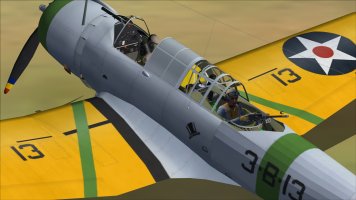Vought SB2U-1 Vindicator
Unit: Scout Bombing Squadron (VB-3) aboard the USS Saratoga
Pilot: Flown by the leader of the 5th flight section
With the delivery of Vought-Sikorsky’s SB2U to the fleet on December 20, 1937, the US Navy took an important technological step. The airplane represented the service’s first monoplane scout-bomber whose speed eclipsed its predecessor in Navy bombing squadrons by 45 M.P.H. There were three versions of the airplane operated by the Navy and Marine Corps. The SB2U-1, of which 54 were ordered, was followed by 58 SB2U-2s delivered beginning in 1938 that differed only in weight, the result of extra equipment, externally it was identical.
By the time of World War II, the Vindicator suffered from the inherent flaw of being the ultimate development of the trussed fuselage and fabric concept, prompting their replacement by newer designs like the SBD Dauntless, which incorporated metal stressed skin construction techniques. Nevertheless, it was available and continued to serve in the Atlantic aboard the USS Ranger (Vs-41 and VS-42) on convoy escort and anti-submarine missions until the summer of 1942.
A later version, the SB2U-3, was developed for the US Marines having extra fuel tanks, a wider horizontal tail and provision for additional 50cal machine guns. As it was over 1,000lbs heavier with no power increase it was too sluggish for carrier operation, but it was only intended for land based Marine aviation.
The French bought 20 under the designation V-156-F in 1939 and placed a second order for an additional 50 in 1940. These could not be delivered before France fell and the British took over the contract naming the type as the Chesapeake.
Credits
Captain Kurt: Aircraft model, US Naval ordinance bombs, bomb racks, VC, paint textures, panel, flight, and .dp file.
Shessi: Pilot figures
Kelticheart: Prop blurred texture
BeePee: compass gauge
unknown: some gauges
Microsoft: Gauges and .air file


Unit: Scout Bombing Squadron (VB-3) aboard the USS Saratoga
Pilot: Flown by the leader of the 5th flight section
With the delivery of Vought-Sikorsky’s SB2U to the fleet on December 20, 1937, the US Navy took an important technological step. The airplane represented the service’s first monoplane scout-bomber whose speed eclipsed its predecessor in Navy bombing squadrons by 45 M.P.H. There were three versions of the airplane operated by the Navy and Marine Corps. The SB2U-1, of which 54 were ordered, was followed by 58 SB2U-2s delivered beginning in 1938 that differed only in weight, the result of extra equipment, externally it was identical.
By the time of World War II, the Vindicator suffered from the inherent flaw of being the ultimate development of the trussed fuselage and fabric concept, prompting their replacement by newer designs like the SBD Dauntless, which incorporated metal stressed skin construction techniques. Nevertheless, it was available and continued to serve in the Atlantic aboard the USS Ranger (Vs-41 and VS-42) on convoy escort and anti-submarine missions until the summer of 1942.
A later version, the SB2U-3, was developed for the US Marines having extra fuel tanks, a wider horizontal tail and provision for additional 50cal machine guns. As it was over 1,000lbs heavier with no power increase it was too sluggish for carrier operation, but it was only intended for land based Marine aviation.
The French bought 20 under the designation V-156-F in 1939 and placed a second order for an additional 50 in 1940. These could not be delivered before France fell and the British took over the contract naming the type as the Chesapeake.
Credits
Captain Kurt: Aircraft model, US Naval ordinance bombs, bomb racks, VC, paint textures, panel, flight, and .dp file.
Shessi: Pilot figures
Kelticheart: Prop blurred texture
BeePee: compass gauge
unknown: some gauges
Microsoft: Gauges and .air file

